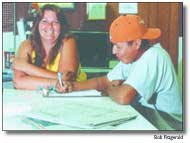|
June 23, 2001
by Janelle Holden journal staff writer When the Colorado Work Force Center closed its doors to day laborers in May, Fred Thomas and the Shelter Ministry offered up an alternative. Nearly 20 to 30 workers now gather at Thomas Engineering on North Broadway each morning to wait for employment such as construction, yard work, haying, and other odd jobs. The laborers, many of whom have traveled for hours, used to register for a hard dayís work at the work-force center on Main Street, but in May the center posted a sign stating that day laborers were no longer allowed to wait for work or even register at the center, and that only phone calls would be accepted. Bill Thoennes, a spokesman for the Colorado Department of Labor and Employment, said the center would like to serve day laborers, but the owners of Slavens True Value Hardware, who lease space to the work center, have complained about the workers taking up business parking spaces on Main Street and loitering in the area. "One of the conditions of the lease now with Slavens is that we can operate as long as we donít pose any kind of risk or problem to Slavens in connecting to their business next door," explained Thoennes. So when Gary Slavens wrote a letter to the center complaining about men standing in front of his store and leaving trash, the center refused to accommodate the laborers any more. "Day laborers often have no place to go and are literally waiting for an employer to stop by," explained Thoennes. "They do pose kind of a unique problem for a work-force center, and if we had a perfect situation weíd be able to provide some place for them to stay ó some waiting area that would not pose a problem for our next-door neighbor, who also owns the lease on the building." Thoennes said that work-force centers owned by the state accommodate day laborers "the same as we would any other customer." Fortunately, the Shelter Ministry stepped up, and Thoennes says that without them he is not sure what the center would have done. "We might run into a problem, and Iím not sure what would happen then," he said. The Shelter Ministry, a group of eight churches that support a winter shelter in Cortez, started a "job ministry" in April 2000, when the work-force center moved in next door to Slavens. The center wouldnít allow laborers to wait for employers, and if they didnít get a job by 9 a.m. Fred Thomas provided a place for them to wait with coffee and doughnuts at his business. Thomas said that business was slow until the sign was put up, and then the volume of men coming in made a sudden jump. As a result, the Shelter Ministries hired Michele McLain, a woman looking for a job herself, to open up Thomas Engineering early and check the men in on a first-come, first-served basis. Then at 8 a.m. she calls the work-force center and finds employment for each man on the list. "Itís getting now that the employers, especially guys who want a guy for a full dayís work, they just drive by here and pick guys up. Because why go through the job service if itís not even open until 8 anyway?" explained Thomas. Thomas said the men looking for work are not drunk or homeless, but rather "family men" who canít find work on the economically-depressed Navajo and Ute reservations. "We look at it as an opportunity. Weíre not Bible-thumpers, but we do like to sit down and talk to people and find out where they come from. It gives us an opportunity to tell them about God, about Jesus," said Thomas, who says he plans to install a shower and hand out sack lunches eventually. "I think that Cortez is a good community, full of kind-hearted, good people, and I think that this is exemplary of the people of Cortez, because they are people that want to make the Native Americans feel welcome," he explained. To find out more about the shelter and job ministries, call Thomas at 565-3759 or stop by at 432 N. Broadway. "We can use people to come here and visit with them. Especially people who have a heart for them," said Thomas. |
||
|
Copyright © 2001 the Cortez Journal.
All rights reserved. |
